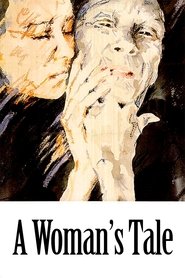From the vantage point of 2023, A Woman's Tale reads very much like a made-for-TV movie, especially with the characters having such predictable character traits and narrative arcs.
Whilst I obviously endorse its attempt to realistically portray an elderly person with a critical illness, perhaps this kind of representation was more necessary in the early 1990s. Still, there are elements that probably didn't even work in 1991: the film's message of "Life is so beautiful. Keep love alive." (and so on) doesn't ring as profound to me and, modulo a scene I will describe below, there was indeed something a little self-satisfied and smarmy about the film's tone throughout. The times where she bullies her way into smoking felt tediously soft-libertarian to me, too, like a scenario entirely imagined by a third-rate Spectator columnist to provide pseudo-evidence for some kind of reactionary political point. I also feel it's worth debating whether Martha's death is representative of how most elderly people die. Although she does seem to be in pain at times, I'm guessing that, quite honestly, this is grossly misleading view of what actually happens in practice.
Still, it rarely lands on exactly saccharine per se, or at least not in the usual British (or Alan Bennett) way, although I suspect nostalgia in conservative Australian boomer circles has a slightly grittier edge to it. The one thing I could easily recognise as 'British', though, was its inevitable-in-retrospect obsession with World War Two and its recollections of a misremembered Blitz: she would have seen Hurricane fighter planes, not Spitfires, and the idea of her "relaxing" at the time is perhaps best read on the fallibility of childhood memories. (Incidentally, like the 'Irish' on St Patrick's Day in the United States, no doubt a whole library shelf could be filled with Aussies bizarre relationship with Britain simply through the memories of WW2.)
The most interesting sequence in this film by far is the one where Martha is listening to talk radio, and a clearly suicidal 16-year-old girl phones in. Martha calls into the show (she has, somehow, a direct line...) in order to speak with her. Yet whilst she tells how "just much there is to live for", that "life is great" and that she "will feel better in the morning" (etc.), it's abundantly clear that her trite platitudes are having no effect whatsoever. The girl, clearly not getting what she needs or wants, abruptly hangs up, and the film jarring cuts to a passing tram car, essentially implying that the young girl has died by suicide. It's a very weird scene that seems to completely undermine the entire premise of the screenplay, yet the film doesn't seem to notice. I did, though.

